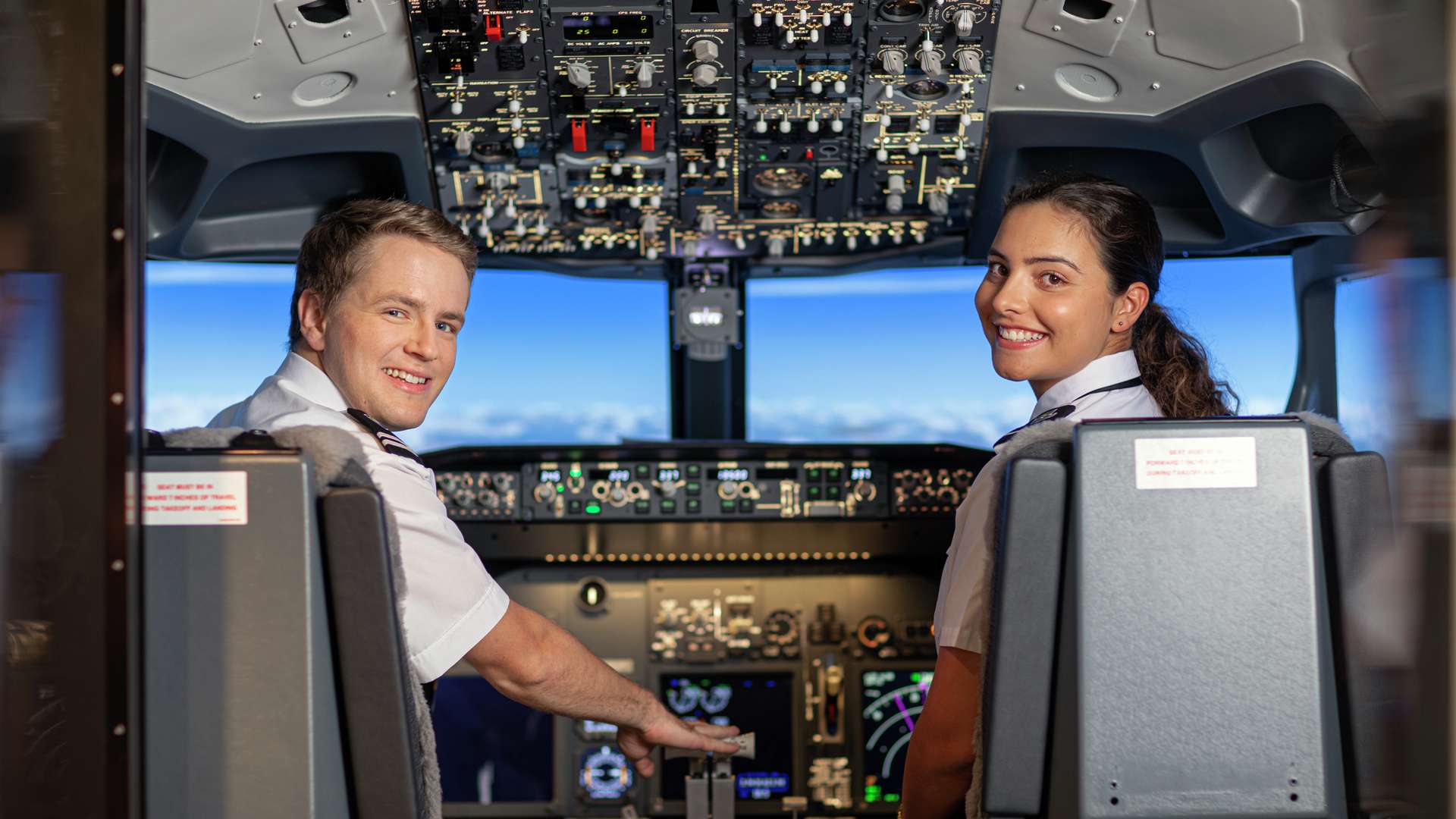
CQU's Bachelor of Aviation will prepare you to launch a diverse career in one of the most important global economic industries, aviation. Our versatile degree features a choice of two majors to suit your interests and career goals. The flight operations major, when studied alongside the Graduate Diploma of Aviation (Flight Operations), allows students to satisfy the knowledge requirements to apply for an Air Transport Pilot Licence to prepare you for a career in the airlines. With a national network of flight partners, you will benefit from CQUniversity’s industry partnerships that broaden your career opportunities, and build your connections within the aviation industry.
The Bachelor of Aviation course will prepare you for a range of careers in the aviation industry including as an Airline Transport pilot and an aviation management professional. In the first year of the course, you will learn the fundamentals of the aviation industry including safety, human factors, relevant national and international laws, airline and airport operations, flight fundamentals and the basics of piloting an aircraft in a simulated environment. You will also lay the foundation to gain crucial lifelong learning and transferable skills.
In the Airline and Airport Operations Major, you will study the core theoretical foundations of aviation operational management including aviation marketing, finance analysis, air freight transportation, resource management and planning and operation. Throughout the course, you will develop skills in critical thinking, decision making, problem solving and teamwork in the context of airline and airport operation. You will develop an understanding of the relationship between human physiology/psychology and the aviation environment by focusing on the function and limitations of the human body, and be introduced to the application of safety processes and how they are applied within the aviation industry and the laws that are relevant to airline and airport operations. Learn to apply your knowledge of aviation management combined with advanced critical thinking skills to solve a range of authentic aviation problems.
The Flight Operations Major will provide you with relevant theory and skills development that support a career as a professional pilot. In this Major, you will study academic subjects and professional pilot aeronautical knowledge to the Bachelor degree standard. You will build knowledge and skills relating to aerodynamics, navigation, meteorology and flight planning, as well as being introduced to the laws that are relevant to aviation and the development and maintenance of a safety management system. You will also undertake units to develop important academic skills such as critical thinking, problem solving, effective communication, and decision-making. Throughout the course, you will learn to apply your aviation knowledge and advanced critical thinking skills to resolve complex airline transport operation scenarios. In the third year of the course, you'll have the opportunity to undertake an advanced aviation experience, which includes your choice of aviation activities that will help you develop knowledge and experience in a specific area of flight operations.
Combined with the Graduate Diploma of Aviation will provide you with the aeronautical experience required for a career as a commercial pilot. During your study, you will gain the aeronautical experience required to apply for a Recreational Pilot Licence, Private Pilot Licence, Command Instrument Rating, and Commercial Pilot Licence.
You will benefit from our national network of flight partners and industry partnerships. CQU's partnership with Aviation Australia provides students with the opportunity to undertake a Civil Aviation Safety Authority (CASA) Multi-Crew Cooperation Course (MCC) in the third year of the Bachelor of Aviation (Flight Operations). A CASA-approved MCC course is a requirement to operate as a pilot in a multi-crew flight.
If you wish to become a licensed Commercial Pilot you will need to complete the Graduate Diploma of Aviation in addition to the Bachelor of Aviation (Flight Operations). During your first year of study in the Bachelor of Aviation, you will be invited to express interest in the Graduate Diploma of Aviation course by undertaking an interview with the Head of Course and/or designated aviation staff member. Students who successfully complete the interview will be invited to apply for the Graduate Diploma of Aviation. You must graduate from Bachelor of Aviation (Flight Operations) before the completion of Graduate Diploma of Aviation.
Discover more about your aviation degree, offering practical experiences and seamless pathways to a career as a commercial pilot. Click 'Explore Study Experience' for more information.

The best thing about CQU is the staff. They have been really helpful.
Daniel Hicks
Bachelor of Aviation, Bachelor of Information Technology, Master of Research
The Bachelor of Aviation (Flight Operations) in conjunction with the Graduate Diploma of Aviation, prepares graduates for aviation careers in the air transportation industry as a professional airline pilot. Graduates will have all the aeronautical knowledge and flight training required to hold an Air Transport Pilot Licence, Commercial Pilot Licence with Command Instrument Rating. Graduates may be eligible to apply for cadetships or traineeships offered by some airlines. Graduates may also be eligible to apply for Australian Defence Force positions.
The Airline and Airport Operations major will prepare you for a career in aviation management. Aviation management is a broad and dynamic field and there are unlimited amounts of aviation business administration jobs that are necessary to keep air travel moving safely. This major provides a broad range of skills, both technical and managerial, that will prepare you to become an aviation professional who understands the theory behind airline and airport operations and can apply these principles to a practical work environment for long-term careers in airline and airport management. Graduates may find employment with airlines and related organisations such as airports, government agencies, tourism authorities, freight forwarders, airport ground handling companies, consulting firms, IT firms and air safety authorities.
The course structure and available locations can change depending on when you want to study. You can choose the intake that best suits you in the drop-down menu below.
Depending on your chosen major, you must complete either 21 or 23 units (144 credits):
The units you'll study are listed below. Click on a unit to learn more.
You will study the eight units listed below.
The Airline and Airport Operations Major consists of the 15 units listed below.
This major will prepare you for a dynamic management career in aviation. It will equip you with a specialist skillset specific to the complex operations environment of the aviation sector. You will study the core theoretical foundations of aviation operational management including aviation marketing, finance analysis, air freight transportation, resource management and planning and operation. You'll be prepared to manage with influence in airlines and airports, tourism authorities, freight forwarders, and air safety authorities.
To help you plan your studies and see which unit comes first, if one unit should be completed before another and the term you will study each unit, check out our course planners.
Aviation Placement is a 12 credit unit for third-year students in the Airline and Airport Operations major who will gain important work experience (up to 240 hrs) directly from industry partners.
If you have completed prior study relevant to units within this course, you may be eligible for credit for your past studies.
For your application to be considered, you must meet the following entry requirements.
View the student and course profiles for this course and learn about CQU's Undergraduate Profile for Term 1, 2025 via our Institute Profile.
CQU offers a range of alternative entry pathways to help you get started. If you don’t meet the entry requirements, there are options available, depending on your background and previous experience.
While not needed to apply, you'll need to meet the following requirements throughout your studies.
The Indicative First-Year Fee is the approximate cost of enrolling in this course for one full-time academic year (eight units over two terms) for a Commonwealth Supported Place (CSP) and should be used as a guide only. Your actual fees may vary depending on the units you select to study and your study load. Check the Cost per Unit spreadsheet available on our Understanding Course Fees webpage.
Fees are reviewed each year and are subject to change. Fee estimates for the following year are expected to be available in September each year.
This course has Commonwealth Supported Places (CSPs) available, and as a domestic student, you'll be offered a CSP, provided you meet CSP eligibility requirements. CSPs are subsidised by the Australian Government, meaning you are only required to pay the student contribution rather than full tuition fees.
You may be eligible for a HECS-HELP government loan if you are offered a CSP. HECS-HELP is an Australian Government loan scheme that assists you in paying your student contributions. Provided you meet the HECS-HELP eligibility criteria, you may use HECS-HELP to defer part or all of your student contribution fees.
Part of your course costs will include Student Services and Amenities Fees (SSAF). SSAF is charged in addition to your student contribution or tuition fees and is used to help enhance your study experience. There may also be other costs as part of your studies, such as textbooks, technology expenses, travel expenses, professional certifications, uniforms, or vaccinations.
We believe a quality education can be for everyone – regardless of background, location, or life circumstances. That's why we offer a variety of scholarships and bursaries that can give you a helping hand with a range of expenses and enhance your employability.
Check what you need to do to apply to study this course.
Prior to applying, take a look at important application dates and learn about our admission considerations, such as information for domestic students with overseas qualifications, indigenous support, and elite athlete, coach and performer support. You should also check out the adjustment schemes that might be available to you and how to access them. You can also explore our offer information to learn more about what happens after you've submitted an application and how to respond to an offer to study with CQU.
When applying through a tertiary admissions centre (TAC) you can use the relevant TAC code below to search for a course or add it to your application preferences.
CQUniversity Australia is a trading name of Central Queensland University
ABN: 39 181 103 288
RTO Code: 40939
CRICOS: 00219C
TEQSA: PRV12073